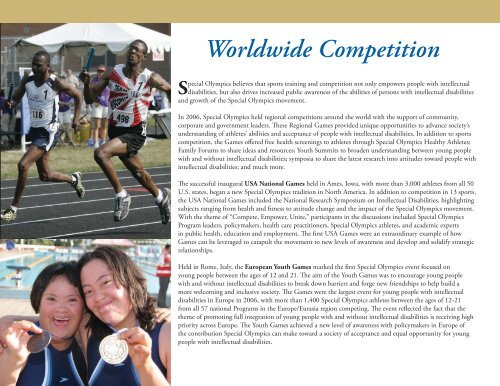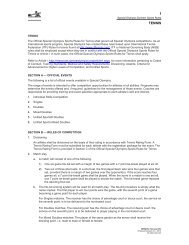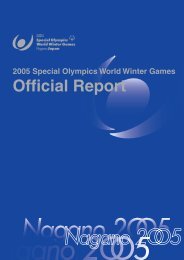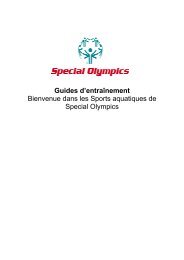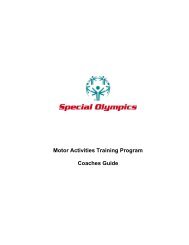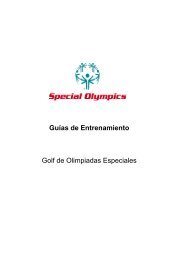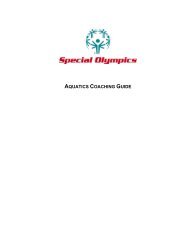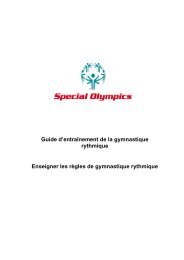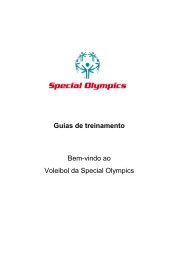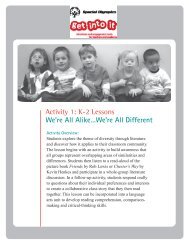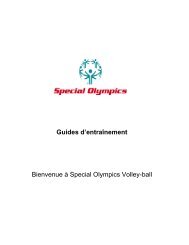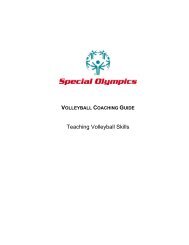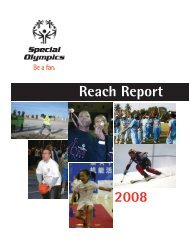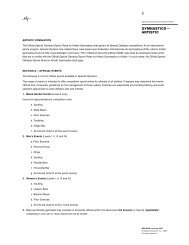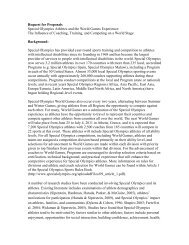2006 Annual Report - Special Olympics
2006 Annual Report - Special Olympics
2006 Annual Report - Special Olympics
Create successful ePaper yourself
Turn your PDF publications into a flip-book with our unique Google optimized e-Paper software.
Worldwide Competition<br />
<strong>Special</strong> <strong>Olympics</strong> believes that sports training and competition not only empowers people with intellectual<br />
disabilities, but also drives increased public awareness of the abilities of persons with intellectual disabilities<br />
and growth of the <strong>Special</strong> <strong>Olympics</strong> movement.<br />
In <strong>2006</strong>, <strong>Special</strong> <strong>Olympics</strong> held regional competitions around the world with the support of community,<br />
corporate and government leaders. These Regional Games provided unique opportunities to advance society’s<br />
understanding of athletes’ abilities and acceptance of people with intellectual disabilities. In addition to sports<br />
competition, the Games offered free health screenings to athletes through <strong>Special</strong> <strong>Olympics</strong> Healthy Athletes;<br />
Family Forums to share ideas and resources; Youth Summits to broaden understanding between young people<br />
with and without intellectual disabilities; symposia to share the latest research into attitudes toward people with<br />
intellectual disabilities; and much more.<br />
The successful inaugural USA National Games held in Ames, Iowa, with more than 3,000 athletes from all 50<br />
U.S. states, began a new <strong>Special</strong> <strong>Olympics</strong> tradition in North America. In addition to competition in 13 sports,<br />
the USA National Games included the National Research Symposium on Intellectual Disabilities, highlighting<br />
subjects ranging from health and fitness to attitude change and the impact of the <strong>Special</strong> <strong>Olympics</strong> movement.<br />
With the theme of “Compete, Empower, Unite,” participants in the discussions included <strong>Special</strong> <strong>Olympics</strong><br />
Program leaders, policymakers, health care practitioners, <strong>Special</strong> <strong>Olympics</strong> athletes, and academic experts<br />
in public health, education and employment. The first USA Games were an extraordinary example of how<br />
Games can be leveraged to catapult the movement to new levels of awareness and develop and solidify strategic<br />
relationships.<br />
Held in Rome, Italy, the European Youth Games marked the first <strong>Special</strong> <strong>Olympics</strong> event focused on<br />
young people between the ages of 12 and 21. The aim of the Youth Games was to encourage young people<br />
with and without intellectual disabilities to break down barriers and forge new friendships to help build a<br />
more welcoming and inclusive society. The Games were the largest event for young people with intellectual<br />
disabilities in Europe in <strong>2006</strong>, with more than 1,400 <strong>Special</strong> <strong>Olympics</strong> athletes between the ages of 12-21<br />
from all 57 national Programs in the Europe/Eurasia region competing. The event reflected the fact that the<br />
theme of promoting full integration of young people with and without intellectual disabilities is receiving high<br />
priority across Europe. The Youth Games achieved a new level of awareness with policymakers in Europe of<br />
the contribution <strong>Special</strong> <strong>Olympics</strong> can make toward a society of acceptance and equal opportunity for young<br />
people with intellectual disabilities.


